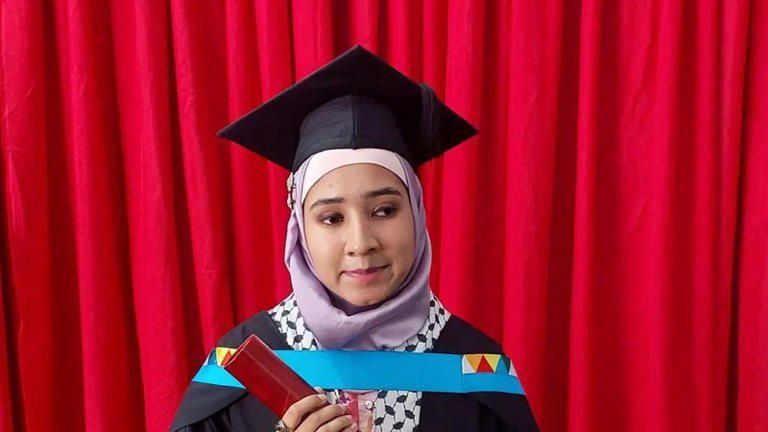
By Al-Qalam Reporter
Despite being blind, Azraa Ebrahim has shattered expectations and soared to academic heights, graduating from the University of KwaZulu-Natal with 14 distinctions this week.
Her journey began amidst the disruption of a global pandemic, having started her studies during the height of COVID-19. Ebrahim graduated cum laude with a Bachelor of Social Science degree, majoring in Religion Studies and Industrial Psychology. She began her studies when all learning was shifted online. Navigating virtual platforms was especially difficult for her due to accessibility limitations. However, with determination and the support of her parents, lecturers, peers, and the University’s Disability Support Unit, she was able to transition successfully to in-person learning. A white cane and assistive tools like screen readers became critical parts of her academic toolkit.
“To ensure I was personally competent, I would begin exam and test preparation a month in advance to account for my slow reading pace. Despite my initial challenges, I am immensely grateful for the relationships I’ve built, the knowledge I’ve gained, and the friends I’ve made along the way,” said Ebrahim.
She was born with a rare eye condition known as bilateral congenital optic atrophy. “There isn’t a lot known about this condition, or about how I got it. We are unsure if it’s genetic or not. Unfortunately, that testing isn’t available in South Africa at the moment. But in a lot of cases of people with this condition, their vision starts to worsen more and more as they get older,” said Ebrahim.
Beyond excelling academically, Ebrahim also distinguished herself through research and public speaking. She presented a paper at the Association for the Study of Religion in Southern Africa
Conference 2024, where she won Best Student Paper and was subsequently invited to publish her work in the Journal of Islamic Studies.
She also spoke at the TIP Eid-ul-Adha Eidgah, delivering a sermon that touched on her personal experiences of growing up blind and facing discrimination.
Collaborating with Dr Cherry Muslim and Chukwudera Nwodo, Ebrahim also presented at UKZN’s Academic Monitoring and Support Colloquium 2024. Their presentation earned them the Best Paper award in their concurrent session, and this was yet another testament to Ebrahim’s academic calibre.
Balancing academic responsibilities with family life wasn’t always easy for her.
During exams, she had to plan meticulously to manage her commitments.
Karate became a vital outlet to decompress and maintain mental health.
She credits her parents for keeping her grounded: reminding her to rest, eat, and care for her vision. Offering encouragement to other students facing similar challenges, Ebrahim said:
“Wear your disability with a badge of pride. Do not look upon it with disgrace, nor attempt to conceal it from societal scrutiny. Disability is often painted as a societal afterthought, but it is important to remember that while our disabilities are integral to who we are, they do not define us entirely. In a world engulfed by discrimination, stigma, and alienation, we must celebrate our uniqueness and challenge socially constructed ways of being.”
Achievement
Reflecting on her graduation, Ebrahim acknowledged the cultural significance of her achievement.
“Within Muslim communities, it is an uncommon reality for a differently abled Muslim woman to attend university – let alone graduate cum laude. While three years of dedication and determination preceded this moment, I take equal joy in the journey that brought me here,” she said. Ebrahim also paid tribute to her loved ones and mentors.
“To my grandfather, who passed away in 2022, I let your wisdom and memories guide me always. I am immensely appreciative of my supervisor and mentor, Dr Cherry Muslim, whose immense belief in me warrants more recognition and admiration than I could ever express,” she said.
As an Honours General Scholarships recipient, Ebrahim is now pursuing her Honours degree in Religion and Social Transformation under the guidance of her mentor, Dr Muslim.
Her research delves into women-led khutbah (sermons) in Islam, aiming to bridge the gap between scholarship, faith, and activism. She wants to move on to pursuing her Master’s degree, and later, a PhD.
“I aspire to be a scholar of Islam and endeavour to eventually enter academia, to pedestalise research on disability from a differently abled positionality. There is not a lot of research on disabilities within Islam. A lot of it tends to be done by people without disabilities. I would like to fill that gap and shed more light on disabilities within Islam,” said Ebrahim.
Ebrahim said her story should be viewed as a beacon of hope and inspiration, not just for students living with disabilities, but for anyone striving to overcome adversity in pursuit of their dreams.











